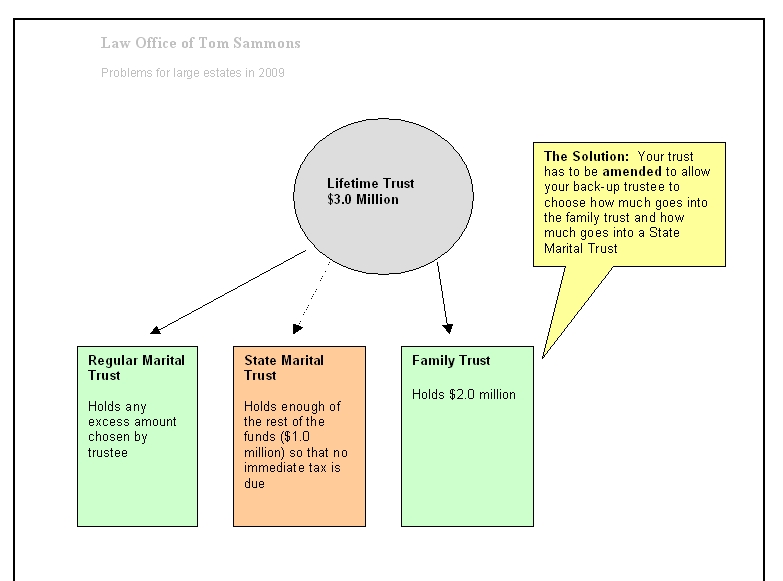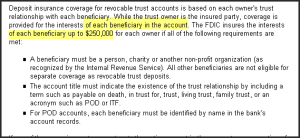 At home, I received a newsletter from a northwest suburban lawyer who prepares a lot of living trusts. This attorney does a lot of seminars and I must be in his direct mail target market now that I am old enough to be in the AARP army. I scanned the newsletter expecting the usual boilerplate, but one story left me amazed.
At home, I received a newsletter from a northwest suburban lawyer who prepares a lot of living trusts. This attorney does a lot of seminars and I must be in his direct mail target market now that I am old enough to be in the AARP army. I scanned the newsletter expecting the usual boilerplate, but one story left me amazed.
It was about how the attorney was experiencing a rash of probate estates that had to be opened for clients with living trusts. (Spoiler alert: You’re not supposed to have a probate with a living trust.)
The story pointed out that the clients simply were not “funding” their trusts correctly, which is the process of changing beneficiaries and the titles of accounts to the living trust. A trust has to be properly funded to avoid probate. If any asset valued at more than $100,000.00 is left in the client’s own name (not jointly or in the trust) a probate will be necessary. Avoiding probate is one of the reasons to use a living trust over a will, so the newsletter story pointed out that this was huge failure. Rather than blaming himself for this, the attorney laid responsibility for this problem squarely where it belonged —on all of his misguided, wayward clients.
After all, he gave the client a letter telling them exactly how to fund their living trust. Why couldn’t the client simply follow his instructions? This attorney is part of the “go in peace my son and fund the trust yourself” school of attorneys. Oddly, when attorneys refuse to participate in funding of trusts, the cost of the trust is usually pretty high. But many attorneys consider trust funding to be beneath them.
I believe that attorneys who draft living trusts have an obligation to help the client fund the trust. I have drafted thousands of living trusts for clients and my clients are intelligent people. They are also very busy and have a million demands and obligations. They do not have the time or the interest to learn how to fund their living trust. Nor should they have to.
I have tried every imaginable combination of methods for funding trusts and after 20 plus years, I’m convinced that, for me, there is only one way to handle trust funding that works. Both the attorney and client have to be involved:
1. It is too much to sign the trust and other documents AND fund the trust in one meeting, unless the trust funding is really simple. I usually sign the trust in one meeting and fund the trust in a second meeting.
2. At the trust signing I set up an appointment for two weeks down the line with the client for a trust funding meeting. If I don’t schedule an appointment at the trust signing, there is about a 60% chance the client will never get back to me and the trust will be left unfunded.
3. At the trust signing, I make a list of the forms that the client must obtain. The client calls for the forms and the forms are mailed or faxed to the client. Many institutions will not send the forms to me, so the client has to undertake this step. I have many of the common forms on file for Fidelity, Vanguard, Schwab and some of the more common companies.
4. From trial and error I have developed one unwavering rule: All beneficiaries must be changed on life insurance and IRA accounts. Many clients say “Oh don’t worry I know my spouse is primary and kids are secondary.” I always change the beneficiary designation for all IRAs and life insurance, even if the trust is not the beneficiary and no matter what the client says. I would estimate that about 75% of the current beneficiary designations are screwed up, missing or wrong.
5. Once all of the forms are obtained by the client, we have the trust funding meeting with the client in my office. I tell the client it will be the most boring 30 minutes of his or her life. I sort through the forms and fill them out for the client. The client signs them. I scan the forms into pdfs and we mail in the originals.
6. The trust funding meeting is essential. Sometimes the client will say “I’ll just drop off the forms and you can fill them in when you have time.” This does not work. First, the client will usually forget to drop off the forms. Second, I will never have the time to complete them. The trust funding meeting forces the client and me to finish the job.


